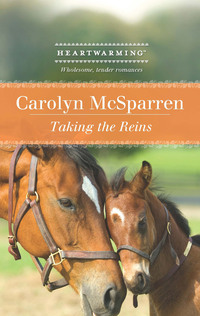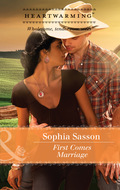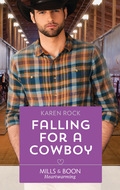Raamatut ei saa failina alla laadida, kuid seda saab lugeda meie rakenduses või veebis.
Loe raamatut: «Taking the Reins»
If he never had to be responsible for anything ever again…it would be too soon for him
Jake Thompson never realized how many decisions he used to make in a day until he lost the nerve to make any and was forced to leave the army. But he’s starting to believe this horse therapy program they’ve put him in might actually help to get past the nightmare of indecision he’s faced since losing his troop. And it’s all because of instructor Charlotte Nicholson.
As if the recently widowed single mom in charge of the rehab farm doesn’t have enough on her plate without Jake adding his problems to hers. But being with Charlie makes him think beyond his pain to the future. If seems as if he’s being offered a second chance at happiness…and all he needs to do is make the decision to take it. Something far easier said than done.
I could drive like this forever.
Jake’s shoulders touched hers as they sat behind the horses, and she felt a wave of guilty pleasure.
Remember, he’s still a warrior even if his smile and his hands are gentle at the moment. Whatever terrible event had broken this man, he showed signs that with time he might heal. The colonel wouldn’t have included him in group therapy if he hadn’t believed Jake could be healthy eventually.
Who knew what he would become once he pushed himself?
He was used to being alone, used to moving to the ends of the earth at a moment’s notice, just like Steve. Steve, the husband she was supposed to be mourning.
Were they so different, Jake and Steve?
Yes, Charlie thought, answering her own question. Here, in this carriage in this twilight, the two men were different. How deep the difference went, she had no way of knowing. Yet.
But she intended to find out.
Dear Reader,
This is a story about five wounded army vets who come to a draft-horse farm in west Tennessee to learn to drive carriages and build new careers. When I read about a group in Virginia that does just that, I knew I had to write Taking the Reins. I’ve been married to a retired army officer for over forty years, so I know firsthand the terrible strain military life puts on the men and women who serve, and their families, as well. Sometimes the wounds don’t show. That doesn’t mean they aren’t there.
If she teaches them to drive successfully, Charlotte (Charlie), the widow of a soldier, will prove she’s capable of running her father’s farm and providing a permanent home for her daughter, Sarah. She’s not interested in love. No more warriors. And her students are definitely off-limits. But then there’s Jake Thompson.…
Not only is Jake Thompson her student, he’s a soldier who is so psychologically damaged he refuses to make the smallest decision. But he can’t deny his feelings for Charlie, no matter how much he wants to. Can he take the chance of hurting her and her daughter? How can he learn to trust himself again?
Can these two damaged people find the strength to grow and heal so that they are worthy of lifelong love? What do you think?
I hope you like Jake and Charlie.
Carolyn
Taking the Reins
Carolyn McSparren
CAROLYN McSPARREN
This is Carolyn McSparren’s first Mills & Boon Heartwarming novel and her fourteenth book for Mills & Boon. Animals are important in all of her books. She has bred, birthed, trained, ridden and driven horses most of her life. At the moment she rides her dressage horse, a 17.2-hand half Clydesdale, and drives her carriage horse, a 16.2-hand half-Shire mare. A RITA® Award nominee and Maggie winner, Carolyn has lived in Germany, France, Italy and “too many cities in the U.S. to count.” She teaches writing seminars to romance and mystery writers, and writes mystery and women’s fiction, as well as romances. Carolyn lives in the country outside Memphis, Tennessee, in an old house with three indoor and half a dozen barn cats, three horses and one husband, not necessarily in order of importance.
MILLS & BOON
Before you start reading, why not sign up?
Thank you for downloading this Mills & Boon book. If you want to hear about exclusive discounts, special offers and competitions, sign up to our email newsletter today!
Or simply visit
Mills & Boon emails are completely free to receive and you can unsubscribe at any time via the link in any email we send you.
Taking the Reins is dedicated to Joanna Wilburn, Bob Martin and the wonderful clinicians who teach me to drive my big half-Shire mare, Zoe. Thanks to the Nashoba Carriage Driving Association, my local driving club, for their stories, and their comradeship. Thanks for Meredith Giere, who makes sure I do things right on my harness and carriage, and to Sam Garner, who taught me to drive in the first place. Thanks to Pam Gamble, who drives a big carriage in downtown Memphis and showed me how to run a stable for very large horses in a very small city space. Finally, thanks to Beverly Hollingsworth, who conned me into my first carriage ride behind a nasty little Welsh pony named Picadilly. I’ve been hooked ever since.
Contents
CHAPTER ONE
CHAPTER TWO
CHAPTER THREE
CHAPTER FOUR
CHAPTER FIVE
CHAPTER SIX
CHAPTER SEVEN
CHAPTER EIGHT
CHAPTER NINE
CHAPTER TEN
CHAPTER ELEVEN
CHAPTER TWELVE
CHAPTER THIRTEEN
CHAPTER FOURTEEN
CHAPTER FIFTEEN
CHAPTER SIXTEEN
CHAPTER SEVENTEEN
CHAPTER EIGHTEEN
CHAPTER NINETEEN
CHAPTER TWENTY
CHAPTER TWENTY-ONE
CHAPTER TWENTY-TWO
CHAPTER TWENTY-THREE
CHAPTER TWENTY-FOUR
CHAPTER TWENTY-FIVE
CHAPTER ONE
CHARLOTTE NICHOLSON, known as Charlie, slewed the elderly pickup through the farm’s front gate in a cloud of dust. She slammed on her brakes, slid to a stop five feet behind the Veterans Administration van, climbed out and ran to meet her class. She was late. Her father, the colonel, would kill her.
“Sorry, Daddy,” she said as she raced up to him. “I had to wait while they loaded the oats into the truck, and then they could only find three of the big trace mineral blocks I need for the pasture.”
Her father stood straight and tall, eyes on the van doors. “Charlotte Abigail, you are ten minutes late. You should learn to budget your time better, if you expect to teach this class.”
“You hired me to run the farm. You blackmailed me into teaching. Anyway, I didn’t miss anything. The van just got here.”
“That’s hardly the point. They were late. You should not have been.” He didn’t turn his head to look at her but continued to smile at the van doors as they soughed open. “I’m not blackmailing you. Call it other duties as assigned.”
Right. Maybe not blackmail, but he’d implied that this class was her baptism by fire. If she could train this small group of wounded vets to drive the draft horses the farm bred, all the while managing the daily operation of the place, she’d prove she was competent to take over the draft horse operation on her own without her father’s constant oversight.
He’d never cared about the farm, but it had always been her paradise. The place where her grandfather taught her to love horses.
Since the colonel owned the farm until his death, when it would pass to Charlie, she didn’t have much choice but to follow his orders. She loved the colonel in spite of what he called their issues, but she’d have preferred to love him from afar after he moved to a luxury condominium in Outer Mongolia. Harder to micromanage her from there.
Teaching this group couldn’t be tougher than teaching her seventh-grade English class at their last post. These veterans actually wanted to learn. Her seventh-graders definitely hadn’t. Thank heaven, her daughter, Sarah, had been in the eighth grade. No teenager liked to be taught by her mother. Sarah would have died of embarrassment.
Except for the vacations Charlie had spent with Granddad, she’d never lived in a house that didn’t belong to the United States Army. She swore she and Sarah would have a real home. Even if it killed her.
Her father hadn’t expected his grant to teach wounded veterans to drive draft horses with an aim of future employment would be approved so soon. I had planned to hire someone to teach while DeMarcus and Maurice continued to handle the barn and the horses, he’d told her. Now that you and Sarah are living here, it’s the perfect opportunity for you to show me what you can do.
Asking her father to provide a home for her and Sarah after Charlie’s husband was killed had been the toughest thing she had ever done, but she had no money until Steve’s death benefits kicked in. That might take a year. In the meantime, it was go home to daddy or live in her truck.
The colonel’s invitation was gracious. Once she got his attention he was always gracious. He refused to admit, though, that so long as he controlled the purse strings, he controlled her.
Now that Steve was dead, any man who tried to control her was in for the fight of his life and that included dear old Dad. She intended to be her own boss from here on. No more men telling her what to do. Definitely no more warriors.
Being back with the horses was heaven. Living as a hired hand in the old home was not. She simply had to convince the colonel she could run it alone. This was her chance.
“Come on, Charlie girl, let’s greet our guests,” he said, taking her arm.
What little confidence she had fled, and if she didn’t already have ulcers, she was about to develop them. But she had to continue to talk a good game. Otherwise, the vets would never trust her to train them.
What if she messed up? What if she made them worse? She shivered despite the ninety-five-degree temperature. “Remember, Charlie, Don’t teach the disabilities. Teach the people.” Her father waved to the van and whispered back, “Of course, if you don’t think you can manage...”
Talk about fighting words. Shoot, yeah, she could do it. “There are times I hate you.” She smiled as she said it, but he knew she was only half kidding.
“Most children hate their parents when they act like parents.”
“Oh, is that what you’re doing?”
“Absolutely.” The colonel stepped forward with his hand outstretched. His worn jeans and red polo shirt couldn’t conceal his military posture. His short hair might be gray, but his belly was still flat. He would always look like Colonel Sanders, the Kentucky Fried Chicken front man, as he had before he retired. Well, semiretired. Technically, he was a civilian psychologist volunteering at the VA hospital in Memphis. This whole project was his baby. He’d written the grant that paid for it.
He had as much an investment in the success of this program as she did. And it had been a long time since she’d made a success of anything. She squared her shoulders and pasted a smile on her face. She’d pull this off if it killed her.
“Welcome to Great Horse Farm. Come on down,” the colonel said as the first figure appeared in the doorway. The woman inside didn’t take the hand he offered but scrambled down the few steps, carrying a duffel bag almost as big as she was.
“Colonel Vining, sir,” she said. She was only about five foot two and weighed maybe a hundred and ten pounds. She wore huge wraparound sunglasses and kept her face turned to the right. Her voice was unexpectedly deep, and for a moment Charlie thought she might salute, but she caught herself. After all, none of them was officially in the military any longer.
“Welcome, Mary Anne,” the colonel said. He didn’t offer to shake her hand; nor did she offer it. Despite the August heat, she wore a long-sleeved plaid cotton shirt over tight jeans, and had tied a plain blue silk scarf over her ears and knotted it at the nape of her neck. A khaki leather glove covered her right hand.
“Mary Anne Howell, may I introduce my daughter, your instructor, Charlie Nicholson. Charlie, this is Mary Anne.”
“Ma’am,” Mary Anne said. No smile. No handshake. She picked up her duffel and stepped aside as a grizzled man with sun-roughened skin and close-cropped gray hair backed down the stairs.
“Come on, Major,” he said, “time to get out. Bring your gear with you.” He might have been coaxing a puppy out of a crate.
As he backed away, a tall, thin man stepped off the bus. Hatless, he blinked in the sunlight. His hair hadn’t been cut in a while, and whoever had done it last hadn’t so much barbered as butchered it. He might even have whacked at it himself. It must have been corn-gold when he was younger. Now the gray had muted it to pewter. His face bore the creases and wrinkles that came from living under a fierce sun.
“Afternoon, Colonel, ma’am,” said the shorter man with a broad grin. “Retired Master Sergeant Sean O’Riley at your service. I won’t shake hands if you don’t mind.” He lifted his right arm. “I don’t have the hang of this danged mechanical gadget yet. I could crush your fingers.”
At first glance the sergeant’s prosthetic hand looked remarkably natural. The skin tone matched O’Riley’s tan, but the skin itself was too perfect. Charlie thought a couple of freckles or liver spots would make it more lifelike.
O’Riley indicated the man beside him, who had neither moved nor spoken. “This is Major Jacob Thompson. Jake, come on over and meet these good folks.”
The man took two steps forward, shook hands with the colonel and nodded to Charlie.
He then took two steps back and waited patiently.
As the daughter of an army psychologist, Charlie had grown up watching her father’s patients come and go. She recognized at once that this man had hit the disconnect switch.
“Hey, get me down off this thing before I fall on my face!”
The tenor voice came from behind the van.
“Hang on,” grumbled a baritone. “Or I’ll shoot you off this lift and onto the road!”
Charlie heard a whir, and a moment later a young man—a very young man—barreled around the end of the bus in his wheelchair like an Indy racer. “Hey. I’m Mickey Peterson. Bet you didn’t expect to have to teach me to drive a carriage, did you?”
The colonel smiled broadly. “Actually, Mickey, we have a carriage set up for your wheelchair.”
“I’m not spending the rest of my life in this thing,” Mickey said. “Soon as I get strong enough on my braces, I’ll race you and your carriage.” He pumped the air. “Hey, Hank,” he called over his shoulder. “Bring me my gear, will ya?”
“You got it.” The man in question walked up behind Mickey and dumped the duffel onto Mickey’s lap.
“Hey, man, not so hard!”
“Why? You can’t feel it.”
“Wanna bet?” Mickey whispered, “Jerk.”
“So you must be Hank,” the colonel said.
“Second Lieutenant Hank Ames.” He shook the colonel’s hand and tossed a dazzling smile at Charlie. “Ma’am?”
“Charlotte Nicholson,” she said. “Everyone calls me Charlie.”
Hank’s hand was rough and strong, like the rest of him, but his nails were manicured. He had the broad shoulders and slim hips of an athlete, and stood eye to eye with her own five-ten. He was also one of the handsomest men Charlie had ever seen outside a Ralph Lauren ad. His too-long mop of black curly hair had been razor cut and he boasted incredible chocolate eyes, and teeth that looked as though every one had been professionally capped and bleached. His Levi’s were starched and pressed, and his plaid rodeo shirt had snaps down the front instead of buttons.
She glanced at his feet. Yep. The boot-cut jeans were too long and bunched at the ankle over cowboy boots, the way real cowboys wore them. Expensive boots, from the look of them. Ostrich, maybe.
“You’re the rodeo rider,” the colonel said.
Instantly the man’s handsome face clouded. “Used to be. Need two feet in the stirrups to ride saddle broncs.”
* * *
MAJOR JAKE THOMPSON considered climbing back in the van and returning to Memphis, but while he hesitated, the doors closed and the engine started.
He turned to follow the others and met the woman’s eyes. Charlie?
She smiled at him. He surprised himself by smiling back, then felt his face flush. She wasn’t beautiful, but her gray eyes were warm and her mouth was generous. He dropped his gaze, surprised that he had responded to her.
She was tall and straight and strong, the way he remembered his sisters being.
Don’t think about your sisters.
Sean grabbed his arm and propelled him forward to join the group. “Come on, Jake, my bucko. You’re going to love it here. You’ll be better in no time.”
He doubted that, but he didn’t argue. He smelled the dry summer Bermuda grass, closed his eyes and heard the breeze whispering through the big oak trees. What would it feel like to lie in the grass again and stare at the stars the way he had as a kid? When everything seemed possible. When his family was still permitted to speak to him. Before he had all those lives on his conscience.
When he’d dreamed of all the places he’d go after he left the farm behind, he hadn’t included Iraq and Afghanistan on his wish list.
“Man, smell that manure,” Hank said. “I do love the smell of horse.”
“Are you kidding me?” Mickey turned in his chair. “Manure? Really?”
“Really,” Jake said, butting into the conversation. Better than the garbage Dumpsters in downtown Memphis. Better than the crowds and noise that never seemed to stop, even at four in the morning when he walked to escape the nightmares. When he saw all those faces. Even after the colonel took charge and rented him a room in a halfway house, he’d stayed only long enough for meals before he began those lone walks again.
Most of the men who hung out on the street and under the overpasses in the downtown badlands had problems with alcohol or drugs. Once they discovered he hardly carried any money, they didn’t hassle him. Everyone left him alone. He was sober and clean, and he didn’t beg.
In any case, even if he’d had the money to dull the pain, he wouldn’t have been able to choose between all the various substances. Since the very, very bad early days after leaving the military, he hadn’t been able to make a decision about anything.
His rational mind knew that wearing mismatched socks would not cause a meteor to fall on Tennessee. But the voice in his head whispered, But if it did, it would be your fault.
You give yourself too much power, the colonel had said in one of their sessions.
Okay, so I choose the wrong pair of socks and get some poor old lady hit by a truck because she’s staring at my ankles. Same difference.
He knew it wasn’t. Why did he keep feeling it was?
He might get better if he could go back in time and change some of the disastrous decisions he’d made. As it was, his safest course was not to make any more. How did he atone for disasters everyone else told him weren’t his fault?
Sean dropped back a stride. “Keep up, Jake.”
“Hey, look at the size of those suckers,” Hank said and pointed toward the pasture, where a half-dozen giant horses lifted their heads and watched the newcomers before continuing to graze. “When do we get to drive ’em?”
“Soon enough,” the colonel said. “Orientation and house rules first. Come on, everybody.” He opened a door into the stable and waited while the group walked inside. “This is the common room. It’s where you’ll meet and eat while you’re here. Mickey, will your chair fit through the entrance?”
“Yeah, if I aim right. Boy, this is some kind of plush for a stable.”
“The living quarters are for visiting clinicians and people interested in the horses,” the colonel said. “The bedrooms are through there.”
“The nearest motel is ten miles away,” Charlie added. “You would not want to stay there. This way, you’re with the horses twenty-four/seven.”
“We’ve got a room and bath set up on the first floor for you, Mickey,” the colonel said, heading in that direction. The others took a quick look and drifted back to the common room, but Charlie stayed with her father and Mickey.
The pocket door to Mickey’s room was extra wide to accommodate his wheelchair. Once inside, the colonel waved around the room. “Lift for the bed, shower and john set up for you. Dr. Steadman vetted it before he signed off to let you come out here. You and Mary Anne will be on the main floor. Sean, Jake and Hank all have rooms upstairs.”
“May need some help with the lifts and stuff,” Mickey said with a grimace. “Call me Tin Man. My braces don’t take to showers real well.” Charlie sensed how much he hated asking for assistance. He cocked an eyebrow at her and leered, “Want to help me?”
She laughed. “Good try. The colonel swears you can manage fine on your own.”
“Oh, well, if I have to. Just keep Li’l Buckaroo Hank away from me. He thinks because he was an officer he’s too good to help an enlisted man.”
“He’s not in the army any longer,” Charlie said. “I’m the only one with rank in this organization.”
“I thought the colonel was in charge here.”
“I’m officially retired,” her father said, “although this program is my idea.” He leaned a hip against the corner of the wheelchair-height dresser and folded his arms. “Charlie is actually responsible for training you guys.” He walked back into the hall. “When you’ve finished exploring, join us in the common room.”
“Excellent,” Mickey said, spinning his chair and rolling over to Charlie. “I can plug my battery in beside the bed. I don’t really need the hoist. I can make it from my chair to the bed and back without hydraulics. This should work.”
“How often do you wear your braces?”
“Not often enough right now, but I’m getting stronger. I’m supposed to walk every day.”
“Don’t you?”
He shrugged. “The braces are a pain to put on and a pain to wear. Sometimes I let it slide, you know? You do have Wi-Fi, right?”
“Yes, Mickey, even here in the outer reaches of space we have Wi-Fi. See you in the common room in fifteen minutes.” She shut his door behind her.
The other trainee room on the first floor had been given to Mary Anne Howell, since she was the only female. Charlie knocked on her door, which stood ajar.
“Settling in all right?” she asked.
Mary Ann turned away and pulled down the sleeve of her shirt to cover the edge of her glove. “Yes, ma’am. Thank you.”
“It’s Charlie, not ma’am, okay?” Charlie wanted to tell her that she didn’t need to cover up, that nobody cared about her scars. Not quite true. Mary Anne cared. Charlie didn’t know the extent of her disfigurement. The others might not, either.
Upstairs, Sean and Hank had rooms across the hall from one another. Charlie reminded them both about the meeting in the common room. “Short orientation, then lunch.”
O’Riley followed her down the hall, caught her arm and said, “Ma’am, better let me bring the major.”
By that time she’d reached Jake’s room. The door stood wide open, and she could see him sitting on the edge of his bed, his hands loose in his lap, while he stared out the window. What was he seeing? The trees and fields, or something else?
“Hey, Jake, buddy, we’ve got to go downstairs for a meeting,” O’Riley said. “You gotta be hungry.”
Without a word, Jake stood. As he passed Charlie in the doorway, he flashed her a smile so sweet it took her breath away. Watching him walk down the hall and start down the steps, she noticed the limp. She pointed to Sean’s room, followed him in and shut the door.
“Okay, what’s with Major Thompson?”
“He’s a good man.”
“I’m sure he is.”
“He took shrapnel in his knee. Knees don’t ever heal right, so he’ll always limp.”
“Sean, that’s not all. I need to know, if I’m going to train him to drive a horse-drawn carriage and take care of draft horses.”
Sean sank onto his bed. Charlie leaned against the wall.
“All I know, he was wounded in an ambush in Iraq. He got out with a bum knee. Nobody else did. Since then he can’t make decisions.” O’Riley shrugged. “Hard to hold a job.”
“I’ll bet.”
“He was my roommate at our halfway house, so I’ve been kind of looking after him since I went there to learn to use my hand.”
Great. So far, the kid in the wheelchair showed the most potential of the lot.
Sean could crush a carriage shaft with his prosthetic hand. Mary Ann wouldn’t look straight ahead, take off her glove or wear a short-sleeved shirt in Memphis heat because of what must be burn scars on her arm. The handsome rodeo rider with one foot gave every impression of being both bad-tempered and bitter.
And finally, Jake Thompson wouldn’t be able to take the reins on a carriage because he couldn’t make a decision about which way to go.
Lovely.
If she could train these people to drive well enough to land them jobs with carriage outfits after they finished the course, she deserved a medal—she just hoped it wouldn’t be a Purple Heart.
Tasuta katkend on lõppenud.









